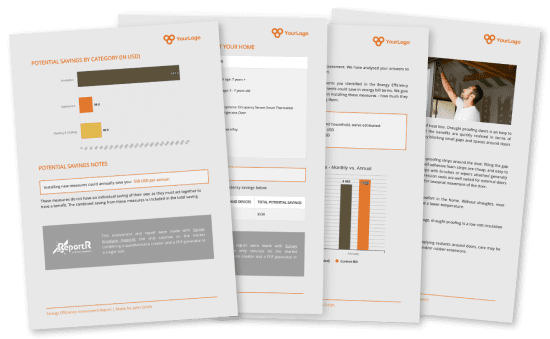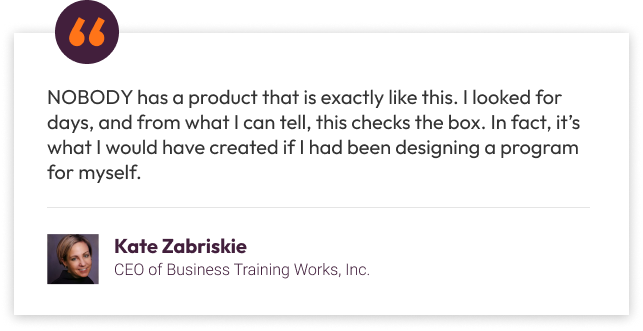A maturity assessment measures the respondent’s maturity in one or more areas through a series of questions. You provide the respondent with a maturity score, along with a personalized PDF report containing recommendations for improvement.
Trusted by more than 1.000 companies worldwide









We use Pointerpro for all types of surveys and assessments across our global business and employees love its ease of use and flexible reporting.

Director at Alere
It’s a great advantage to have formulas and the possibility for a really thorough analysis. There are hundreds of formulas, but the customer only sees the easy-to-read report. If you’re looking for something like that, it’s really nice to work with Pointerpro.

Country Manager Netherlands at Better Minds at Work
NOBODY has a product that is exactly like this. I looked for days, and from what I can tell, this checks the box. In fact, it's what I would have created if I had been designing a program for myself.

CEO of Business Training Works, Inc.
Remove any reference to Pointerpro and add your own brand colors, fonts, and logos with our White label solution. You can even brand the quiz URL, PDF reports, dashboards, and editor.
No expensive or time-consuming process. Effortlessly integrate your branding for an end result that looks like it was custom built and designed.

I was able to create a customized, responsive backend combined with a clean front end that automatically generates reports and sends them to clients. The math that I’ve done says: Based on what I’m paying Pointerpro, I can run my company for the next 20 years and it’ll still be cheaper than a custom-built solution.

Founder of Passions and Talents
Pointerpro is easy to use and comes with out-of-the-box modern designs to get you started. I like how easy it is to customize the look and feel.

Director of Marketing at Medisolv
Given the limitless capabilities of the Pointerpro platform, organizations envision audacious assessment projects to catalyze their business.
Whatever resources you may lack to manage the scope of your imagination, we can handle for you.
You think it, we’ll build it.

We’re ISO 27001:2022 certified!
ISO 27001 certification assures our customers of a steadfast commitment to maintaining the highest standards of information security and safeguarding their valuable data.
This certification underscores Pointerpro’s dedication to meeting global benchmarks and instilling confidence and trust in the reliability and security of its services.

A maturity assessment is a process used to evaluate and measure the level of development or progress of something, such as an organization, a project, a product, or a concept, in terms of its maturity or readiness. It helps to determine how advanced or sophisticated something is in its current state, and provides insights into areas that may need improvement or further development.
In simpler terms, a maturity assessment is like taking a snapshot of how well something has grown or progressed over time, and evaluating its current state in relation to predefined criteria or benchmarks. It is often used as a tool to identify strengths, weaknesses, and areas for improvement, and to guide decision-making and resource allocation.
For example, in the context of an organization, a maturity assessment may evaluate its processes, systems, culture, and capabilities to determine how mature they are in relation to industry best practices or organizational goals. It may involve the use of questionnaires, interviews, data analysis, and other assessment methods to gather information and measure the maturity level of the organization.
Overall, a maturity assessment provides an understanding of the current state of something and helps to identify opportunities for growth and improvement, making it a valuable tool for decision-making and planning.
A maturity level or maturity score indicates the degree of maturity of the respondent in a specific area. The number of levels is dependent on the assessment: typically, there are between 3 and 10 maturity levels that can be reached. Below is an example of the maturity levels in a 4-level business transformation maturity assessment:
- Level 1: Incidental. You are executing a few activities but these activities happen often by accident, not from strategic intent.
- Level 2: Intentional. Your business is carrying out activities that support transformation but your efforts are not yet automated. You identified the need to transform and the appropriate culture is usually present in small groups or departments but not yet in the entire company.
- Level 3: Integrated. Your business has an advanced level of maturity, you carry out many transformative initiatives, which allows you to construct a mature culture and organization. The activities are executed with high strategic intent and are well-coordinated and automated.
- Level 4: Optimized. The transformation has become an actual component of your company culture. All your activities are coordinated, automated, and streamlined.
Maturity measures the ability of an organization for continuous improvement in a particular discipline. The higher the maturity, the higher the chances that mistakes or errors will lead to improvements either in the quality or in the use of the resources of the discipline as implemented by the organization. The maturity assessment can be used for different purposes.
The most commonly used maturity assessments:
- The Capability Maturity assessment is a model that indicates the level of software development of an organization. The capability model (CMM) has become the standard for measuring capabilities in the software development industry.
- The Security Maturity Assessment gives you a first look at how mature your organization is concerning cybersecurity. By knowing your level of security, you can build an effective cyber protection strategy for the future.
- Business process maturity assessment. The business process maturity assessment will help you to build a framework for your business processes. So you can focus on improving the maturity level of your core processes. For example sales processes.
Maturity assessments are especially valuable:
-
Before a transformation initiative (digital, strategic, operational)
-
When aligning teams around a roadmap or standard
-
During audits or certifications
-
To benchmark progress over time
They can be run annually or at key turning points in your business lifecycle.
A diagnostic typically identifies problems or symptoms at a single point in time.
A maturity assessment evaluates development along a continuum, often against a predefined model.
While a diagnostic asks “What’s wrong?”, a maturity assessment asks “How far along are we - and what’s next?”
Pointerpro is a software platform to create your own online assessments, automatically generate personalized reports and manage the distribution of assessments.
Your assessment challenges and objectives are unique to you. So is our pricing. Request your quote and find how we can help you.
Yes, we are.
This depends on the plan. You can pay monthly for the Professional and the Enterprise plan.
You’re in safe hands. We’re ISO 27001:2022 certified!
ISO 27001 certification assures our customers of a steadfast commitment to maintaining the highest standards of information security and safeguarding their valuable data. This certification underscores Pointerpro’s dedication to meeting global benchmarks and instilling confidence and trust in the reliability and security of its services.
Pointerpro’s servers are hosted at Amazon Web Services (AWS) in Ireland (EU/EEA) (more info here), the world’s largest and most reliable cloud infrastructure provider. This ensures compliance with EU data protection regulations and guarantees high standards of security and reliability. All our servers are set up redundantly to prevent loss of data or unavailability of any kind. Our SLA with AWS ensures any issue be taken up with the highest priority. Our specialized infrastructure and operations provider keeps a watchful eye to make sure everything is done following the highest standards and operating smoothly. For more info check Pointerpro’s security statement.
We have over 50 languages supported. You can create each assessment and report in one or more languages. You can check the full supported languages list here.
We offer two approaches: Do-it-yourself (DIY) and done-for-you (DFY).
DIY is a hands-on approach to building everything by yourself. We will ensure you learn how to use the key features to build a great assessment and report. Likewise, we’ll support you until you are ready to go live and launch the assessment to the respondents
DFY is the quickest way to get there. Our team will do the heavy lifting here. You will simply share with us the existing version of the assessment and pdf report and we will translate them into Pointerpro. Once we are done, we will teach you how to make changes to it, teach you how to distribute the assessment for you to master your desired workflow. You can reach out to support@pointerpro.com
It’s best to get started right away but our team is there to help you to feel comfortable when using the tool based on your own needs and timings. We also have a clear onboarding process in place.
We offer a do-it-yourself solution to build your own assessments, ranging from personality to skills to cybersecurity, and far beyond. The aim of our platform is to help you leverage your own expertise. That means, we don’t provide any content for your assessments.
Our onboarding process is designed to help you get up and running smoothly - whether you're starting from scratch or already have something in mind! The Onboarding Team will guide you through the key steps to create and launch your assessments and reports with confidence. After the Onboarding, our support team is available whenever you need extra help or have additional questions.
We are a global company that serves businesses across every industry with stories similar to yours. Check out our gallery of customer case studies or feel free to ask for some other specific cases we can share.




